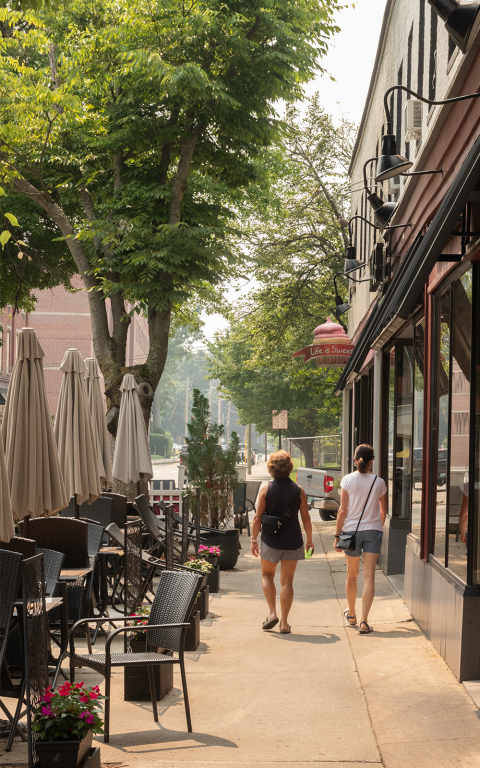The Right Connection
If you build it, they will come…But only if there is accurate signage, appropriate lighting and clear direction.
New Hampshire has many bustling downtowns and scenic nature trails, but lack of access and confusing wayfinding can sometimes prohibit communities from utilizing their full potential. UNH Extension community and economic development staff are available to help communities understand areas of improvement through the Downtowns & Trails program.
Extension state specialist and professor Shannon Rogers and Extension field specialist Jada Lindblom have worked with the City of Keene on developing strategies to better connect two rail trails with their downtown, resulting in a comprehensive report.

Andy Bohannon serves as director for Keene Parks, Recreation and Facilities Department and has championed change for the city. “Keene is nestled in the southwest corner of the state; it’s an economic hub. We offer so many things — we have a very strong arts culture, a vibrant downtown with businesses, shops and dining. We also have over 40 miles of trails,” he says.
With a population of just under 23,000, Keene is a prime example of a New Hampshire town that offers an eclectic array of shops, bustling offices and cultural attractions but could improve upon its destination status as a place for tourists to seek out.
Extension’s Rogers and Lindblom reviewed opportunities for connecting trails to the downtown and assessed current conditions. They also trained volunteers to administer an intercept survey to generate feedback from residents and visitors. They engaged with groups like the Keene Rotary Club, Keene Downtown Group, City of Keene Bicycle Pedestrian Pathways Advisory Committee and local business owners.
Bohannon has been instrumental in serving as a leader for the city. “As recreation director, I feel it’s my job to make our parks and trails attractive not only for community members but also for those who want to visit. It’s about making sure we are a welcoming city. During the COVID-19 pandemic we saw a significant increase in trail use, especially on the mountain biking side.”
Takeaways from the Keene Downtowns & Trails Report
Wayfinding was the number one find and the catalyst behind the project. Through collecting data on characteristics like trailheads, pathways, landscaping, restrooms, sidewalks and entrances, Keene is now working to better enhance the experience of the people who use trails to access downtown. Wayfinding considers the ways people orient themselves and navigate from place to place.
Another significant takeaway has been recognizing the need to make businesses aware of and engaged with Trail Finder – a free, online map that provides a platform for businesses to promote their trailside services.
Bohannon encourages other communities in the state who are interested in boosting business and elevating experiences to connect with UNH Extension. “If you’re thinking about the economic impact of your trails to your community, you must do this study. You also need to recruit the right volunteers – we had a committee that ran the effort, so the buy-in was already there. If you’re committed to making change and improving your downtown through the trails, this is the program that you want to participate in.”
He also acknowledges the support from Extension staff. “Shannon and Jada have been amazing to work with — they are dedicated, passionate individuals who want to see communities better themselves. We appreciate their efforts.”

In fall 2023, an undergraduate student and a doctoral student from UNH are working for the City of Keene, advised by Extension staff, to conduct an economic analysis of mountain biking.
Bohannon continues to work with fellow residents to help Keene become a popular overnight destination – a place where people play, eat, shop, stay and return.

